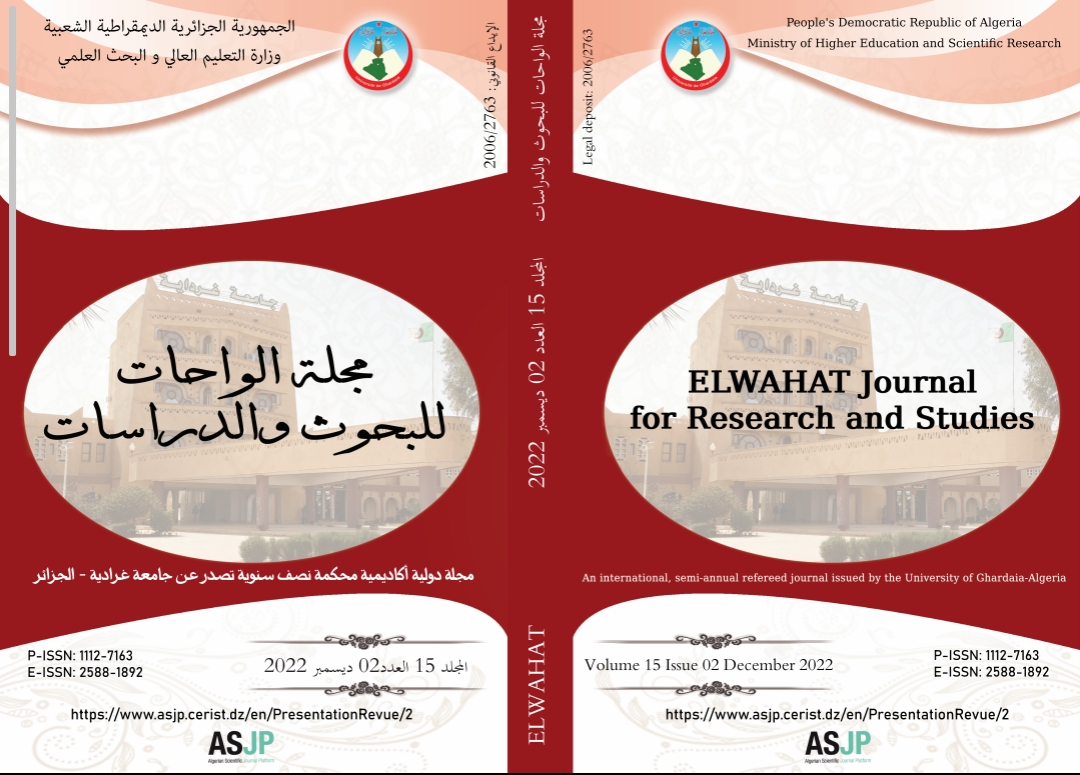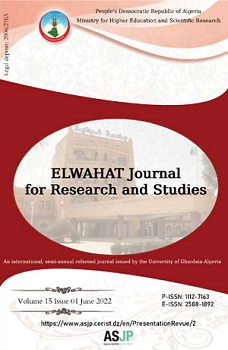تحليل أثر حرية القرار في العمل، الاحتراق الوظيفي والرضا الوظيفي على التغيب عن العمل لدى عينة من موظفي الوظيف العمومي بولاية سعيدة/الجزائر باستخدام المعادلات الهيكلية
Résumé
ملخص:
هدفت هذه الدراسة إلى بناء نموذج هيكلي سببي تم من خلاله معرفة أثر الاحتراق الوظيفي معبرا عنه بالإنهاك العاطفي، حرية القرار في العمل والرضا الوظيفي على التغيب تبعا للإطار النظري والدراسات السابقة. لهذا الغرض قمنا بدراسة امبريقية لعينة من موظفي الوظيف العمومي لولاية سعيدة/الجزائر، تماشيا مع إشكالية البحث تم الاعتماد في عملية التحليل الإحصائي للبيانات على أساليب نمذجة المعادلات الهيكلية(SEM) وبالتحديد استخدام طريقة التشابه الأعظم maximum likelihood (ML) وطريقة اعادة المعاينة (Bootstrapping) في تقدير النموذج. توصلت الدراسة إلى وجود أثر سلبيي مباشر ومعنوي للرضا الوظيفي على التغيب قدر ب (-1.784)، ووجود أثر غير مباشر سالب ومعنوي لكل من للإنهاك العاطفي وحرية القرار على التغيب بوجود الرضا الوظيفي كمتغير وسيط. بينت هذه النتائج دور هذه المتغيرات كمتنبئات للتغيب ولهذا ينبغي على المديرين التركيز على جوانب محددة من الرضا الداخلي والخارجي للحد من ظاهرة التغيب.
كلمات دالة: تغيب، إنهاك عاطفي، حرية قرار الموظف، رضا وظيفي.
Abstract:
The Study Aimed To Build A Causal Structural Model Through Which The Effect Of Burnout, Expressed In Emotional Exhaustion, Decision Latitude, And Job Satisfaction In Absenteeism According To The Theoretical Framework And Literature Reviews. For This Purpose, We Conducted An Empirical Study For A Sample Of A Public Function In The City Of Saida, Algeria. In Line With The Research Problem, The Statistical Analysis Of The Data Is Based On The Structural Equations Modelling (SEM) Method, Particularly By Employing The Maximum Likelihood Method And The Bootstrapping Method In Estimating The Model. The Study Discovered A Direct Negative And Significant Effect Of Job Satisfaction On Absenteeism (-1.784); And An Indirect Negative And Significant Effect Of Emotional Exhaustion And Decision Latitude On Absenteeism With Job Satisfaction As A Mediating Variable. These Results Showed The Role Of These Variables As Predictors Of Absenteeism. Managers Should Focus On Specific Aspects Of Internal And External Satisfaction To Reduce Absenteeism.
Keywords: Absenteeism; Emotional Exhaustion; Decision Latitude; Job Satisfaction
Références
1.7. المراجع باللغة العربية:
• أمال، ز. (2014). أثر الصراع التنظيمي على الرضا الوظيفي للعاملين -دراسة ميدانية لمؤسسة الكوابل.بسكرة. بسكرة.
• حسونة، ف. (2011). ادارة الموارد البشرية. الاردن-عمان: دار أسامة للنشر والتوزيع.
• رحوي، فؤاد. (2014). وضعية العامل المتغيب داخل المؤسسة.رسالة دكتوراه في القانون الاجتماعي. وهران: جامعة وهران.
2.7.المراجع باللغة الأجنبية:
• Nwahanye, E. (2016). Le rôle médiateur de la satisfaction au travail dans le lien entre l'intensité de la gestion des ressources humaines et le roulement du personnel. la revu gestion et organisation/Disponible en ligne sur www.sciencedirect.com.
• de Schoot, R., Schalken, N., & Olff, M. (2017). Systematic search of Bayesian statistics in the field of psychotraumatology. European Journal of Psychotraumatology.
• Gaudet, M.-C., Tremblay, M., & Doucet, O. (2009). LEADERSHIP TRANSFORMATIONNEL, ÉPUISEMENT ÉMOTIONNEL, COMPORTEMENTS DE CITOYENNETÉ ET ABSENTÉISME : LE RÔLE MÉDIATEUR DE LA PERCEPTION DE JUSTICE. congrès de l'Association des sciences administratives du Canada (ASAC).division Ressources humaines. Canada.
• Schaumberg, R., & Flynn, F. (2017). Clarifying the Link Between Job Satisfaction and Absenteeism:The Role of Guilt Proneness. Journal of Applied Psychology.
• Steers, R., & Rhodes, S. (1978). Major Influences on Employee Attendance: A Process Model. Journal of Applied Psychology(Vol. 63, No. 4, 391-407).
• Thirulogasundaram, V., & Sahu, P. (2014). Job Satisfaction and Absenteeism interface in Corporate Sector –A study. IOSR Journal Of Humanities And Social Science (IOSR-JHSS), Volume 19, Issue 3, PP 64-68.
• Van Jaarsveld, D., & Keyser, E. (2018). The Moderating Role of Job Satisfaction on Workplace Absenteeism and Substance use amongst the Employees at a Power Utility in Mpumalanga. www.researchgate.net.
• Ybema, J., Smulders, P., & Bongers, P. (2010). Antecedents and consequences of employee absenteeism: A longitudinal perspective on the role of job satisfaction and burnout. European Journal of Work and Organizational Psychology.
• Bakker, A., Demerouti, E., De Boer, E., & Schaufeli, W. (2003). Job demands and job resources as predictors of absence duration and frequency. Journal of Vocational Behavior, 62 (2003) 341–356, 343.
• Bouville, G. (2007, 05 17,18 et 19). L’audit social de l’absentéisme : quel regard, sur quelle mesure ? ResearchGate.
• Brooke, P., & Price, J. (1989). The determinants of employee absenteeism: An empirical test of a causal model. Journal of Occupational Psychology, 62, 1-19.
• Compell, j., & Scarapelle, v. (1983). Job Satisfaction. Journal of personal Pyscholegy, V.101( No:4 ), 36.
• David, L. Streiner. (2005). Finding our way: an introduction to path analysis. In: Research methods in psychiatry. 115.
• Dumas, M. (2006). De la gestion de l’absentéisme `a la gestion de la sante dans une entreprise de cosmétiques. Management de la sante et de la securite au travail.
• Federica, C., Massimo, G., & Luigi , R. (2014). Managing absenteeism in the workplace: the case of an Italian multiutility company. Procedia - Social and Behavioral Sciences, 150 ( 2014 ) 1157 – 1166, 1159.
• Goldberg, C., & Waldman, D. (2000). Modeling employee absenteeism: Testing alternative measures and mediated effects based on job satisfaction. Journal of Organizational Behavior.
• Harindranath , R., & Jayanth, J. (2018). Bayesian structural equation modelling tutorial for novice management researchers. Management Research Review.
• Hoppock, R. (1935). job satisfaction. Harper& Brothers, 47.
• I. Niedhammer, J.-F. Chastang, L. Gendrey, S. David, & S. Degioanni. (2006). Propriétés psychométriques de la version française des échelles de la demande psychologique,de la latitude décisionnelle et du soutien social du « Job Content Questionnaire » de Karasek : résultats de l’enquête nationale SUMER. Santé publique, 18, no 3, pp. 413-427, 414.
• Martocchio, J. J. (1994). The Effects of Absence Culture on Individual Absence. Human Relations, 47 issue: 3, page(s): 243-262.
• Michel, T., Gilles, S., & Lia, M. (2013). Effet médiateur du niveau de mobilisation dans la relation entre la satisfaction et l'absentéisme et effet modérateur de la dispersion: une étude des unités de travail. 04.
• MUCHINSKY, P. M. (1977). Employee Absenteeism: A Review of the Literature. Journal of Vocational Behavior 10, 316-340.
• Robert Drago, & Mark Wooden. (1992, July). The Determinants of Labor Absence: Economic Factors and Workgroup Norms across Countries. in Industrial and Labor Relations Review, 45(4), July 2002, pp. 764-778.
• Romero, T. A., & Kelly J. Strom. (2011, October). Absenteeism in a Represented Environment. International Journal of Humanities and Social Science, Vol. 1 No. 15, 1-2.
• Sanne , C., Daniel, M., Milica , M., & Rens van , d. (2020). Bayesian Versus Frequentist Estimation for Structural Equation Models in Small Sample Contexts: A Systematic Review. Structural Equation Modeling: A Multidisciplinary Journal.
• Schaufeli, W. B. (1998). The burnout companion to study and practice : A critical analysis. London : Taylor & Francis.
• SCOTT, K., & TAYLOR, G. (1985). AN EXAMINATIONOF CONFLICTING FINDINGS ON THE RELATIONSHIPBETWEE JOBSATISFACTIONAND ABSENTEEISM A META-ANALYSIS. Academy of Management Journal, Vol. 28, No. 3, 599-612., 599.
• Spector. (1997). Job satisfaction : Application, assessment, causes, and consequences Thousand Oaks, CA, US: Sage Publications, Inc.
• Thébaud, A., & France Lert. (1983). ABSENTÉISME ET SANTÉ :UNE REVUE CRITIQUE DE LA LITTÉRATURE. Sciences sociales et santé, 1, n°2, 1983. pp. 7-24.
• Vandenberghe, C., Stordeur, S., & d’Hoore, W. (2009). Une analyse des effets de la latitude de décision, de l'épuisement émotionnel et de la satisfaction au travail sur l'absentéisme au sein des unités de soins infirmiers. Le travail humain, (Vol. 72), p. 209-228, 212.
• zheng, l., plaisent, m., zuccaro, c., & bernad, p. (1983). introduction a la modelisation structurelles amos dans la recherche en gestion. canada: Québec.canada.







